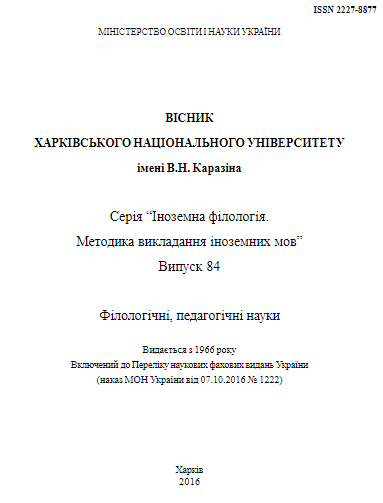Some peculiarities in linguistic usage of Pittsburgh Speech through the prism of gender category
Abstract
The article deals with the peculiarities of the linguistic usage of Pittsburgh Speech (nouns and verbs) in the light of the social category gender. The author has reviewed the concept of «gender» and has analyzed the lexical usage of Pittsburgh citizens in the context of dividing its population into gender identities: women and men. The article reviews the investigations of foreign linguists and it has been noticed that there is a type of definite gender peculiarity in the speech and linguistic usage of the citizens of the given area. Monophthongization is the most widespread phenomenon among the speech characteristics of the citizens in this territory. Considerable distinctions between the sexes in the propensity for this phonetic process are observed. It is notable that among women the tendency for monophthongization is presented only in the group whereas it is presented among men of all age-groups. As a result we can conclude that this phonetic process is characteristics of men in general. There have been given examples of the lexical units (proper and common nouns, verbs), which are widespread in Pittsburgh. The given lexical units are divided into the following sense-groups: group of general usage, sports and fashion vocabulary.
Downloads
References
Козачишина О.Л. Лінгвістичні прояви гендерних характеристик англомовних художніх текстів (на матеріалі американської прози ХХ сторіччя) : дис. ... канд. філол. наук : 10.02.04/ О.Л. Казачишина. – Київ, 2003. – С. 316.
Мартинюк А.П. Речевое поведение мужчин и женщин в неформальной коммуникативной ситуации / А.П. Мартынюк, П.Н. Землянский // Пол и его маркировка в речевой деятельности / отв. ред. Е.Н. Шовгеля. – Кривой Рог : МИЦ ЧЯКП,
– С. 114–126.
Петренко А.Д. Мова чоловiкiв i жiнок як одиниця соцiолiнгвiстичного дослiджен-ня / А.Д. Петренко, Д.А. Петренко, Э.Ш. Исаев // Мовознавство. – Київ, 1999. – № 1 – С. 6471.
Трофимова Е.И. Терминологические вопросы в гендерных исследованиях / Е.И. Трофимова // Доклады Второй Междунар. конф. «Гендер: язык, культура, коммуникация», 22–23 ноября 2001 г. / под. общ. ред.
И.И. Халеевой : Моск. гос. лингв. ун-т. Лаборатория гендерных исследований. – М., 2002. – С. 41–55.
Cameron D. Performing Gender Identity: Young Men’s Talk and the Construction of Heterosexual Masculinity // Language and Masculinity/ Edited by Johnson S. and Meinhof U.H. – Blackwell Publishers, 1997. – P. 45–63.
Cameron D. Feminism and Linguistic Theory / D. Cameron. – McMillan Press Ltd., 1992. – P. 247.
Coates J. Women, Men and Language. A Sociolinguistic Account of Sex Differences in Language / J. Coates. – New York : Longman, 1986. – P. 16.
Fishman P.M. Interaction: the work women do / P.M. Fishman // Sociolinguistics. Coupland N., Jaworski A. (eds.) MacMillan Press, 1997. – P. 416–429.
Holmes J. Women, men and politeness / J. Holmes. – Essex, UK : Longman, 1995. – P. 254.
Holmes J. Women’s Talk: The Question Of Sociolinguistic Universals / J. Holmes // Australian Journal of Communication. – 1993. – 20 (3). – P. 125–149.
Holmes J. Hedging, fencing and other conversational gambits: an analysis of gender differences in New Zealand Speech / J. Holmes // Women and Language in Australian and New Zealand Society / Pauwels A. (Ed.) – Australian Professional Publications, Sydney. 1987. – P. 59–70.
Johnstone B. Pittsburgh Speech and Pittsburghese / B. Johnstone, D. Baumgardt, M. Eberhardt,
S. Kiesling. – Berlin/Boston : Mouton de Gruyter, 2015 – P. 31–46.
Labov W. 50 msec. / W. Labov, M. Baranowski // Language Variation and Change. – 2006. – № 18. – P. 223–240.
Lacoff R. Language and Woman’s Place Text / R. Lacoff. – New York, 1998.
Nichols P.C. Linguistic Options and Choices for Black Women in the Rural South / Patricai C. Nichols // Language, Gender and Society (edited by Thorne, Kramarae, and Henley). – Rowley : Newberry House Publications, Inc., 1983. – P. 54–68.
Tannen D. You Just Don’t Understand: Women and Men in Conversation / D. Tannen. – New York : William Morrow, 1990. – P. 319.
Trudghill P. The Social Differentiation of English in Norwich / P. Trudghill. – Cambridge : Cambridge University Press, 1974. – P. 279.
Kiesling S. Competing Norms, Heritage Prestige, and the Decline of /aw/-Monophthongization
in Pittsburgh [Електронний ресурс] / S.F. Kiesling, M. Wisnosky // Paper presented at the 32nd annual conference on New Ways of Analyzing Variation (NWAV 32), Philadelphia, 9-12, Oct. 2003. – Режим доступу : http://www.pitt.edu/~kiesling/kiesling-wisnosky-aw.pdf
Pitsburgeese Glossary: Sports [Електрониий ресурс] // Pitsburgeese.com. – Режим доступу : http://www.pittsburghese.com/glossary.ep.html?type=sports
Pitsburgeese Glossary: Verbs [Електронний ресурс] // Pitsburgeese.com. – Режим доступу : http://www.pittsburghese.com/glossary.ep.html?type=verbs
United States Census Bureau. Official site [Електронний ресурс]. – Режим доступу : http://factfinder. census.gov/faces/tableservices/jsf/pages/productview. xhtml?pid=DEC_10_SF1_QTP1&prodType=table




